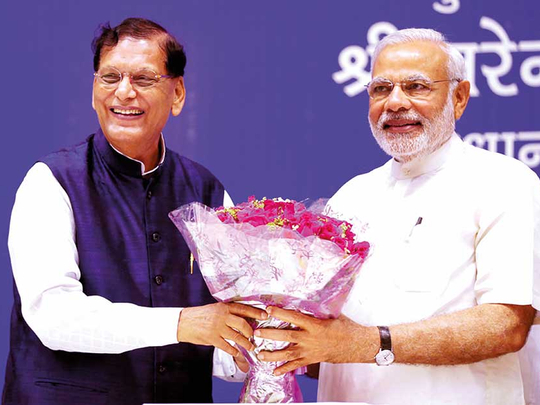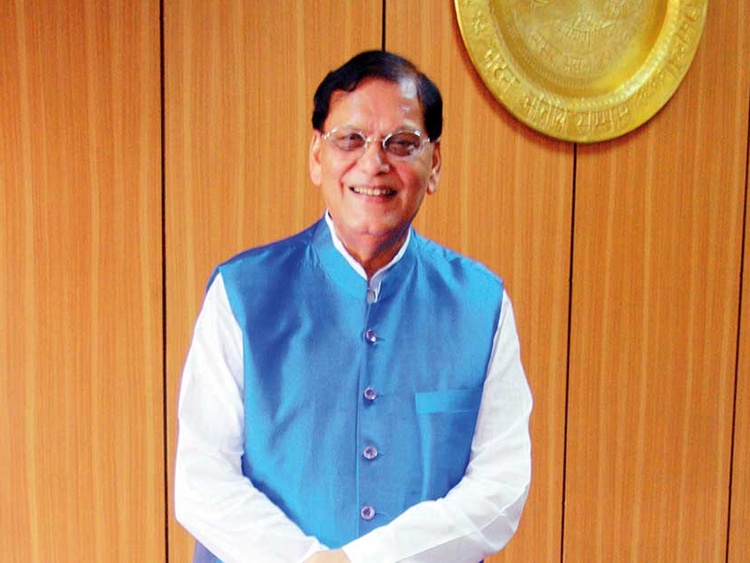
“I am the son of the son of Mahatma Gandhi, but Dr Bindeshwar Pathak is the son of Gandhi’s soul,” said Professor Rajmohan Gandhi, acknowledging the exemplary work of Dr Pathak, founder of Sulabh International, the largest non-profit organisation in India.
Truly, while people only try to follow the lifestyle of Gandhi, Dr Pathak has executed his philosophy and thoughts. Treating sanitation as his mission and human development as his goal, Dr Pathak says, “Sanitation is a mission. It is not like constructing a bridge or a road. I am happy that in my lifetime, I am able to fulfil Gandhi’s dream of eradicating scavenging and improving the living conditions of scavengers.”
Dr Pathak is probably the only reformer in India who has bagged the maximum number of national and international awards for his work towards improving sanitation and upgrading of environment. Following the words of Winston Churchill, ‘We make a living by what we get, but we make a life by what we give,’ the silent crusader has worked relentlessly for years. The result is that more than 20 million people use toilets based on Sulabh design daily in India and several thousand jobs have been created by the organisation.
“I made ideas the basis of my movement, without thinking of gains in return,” he says with as much simplicity as the name he chose for his organisation – Sulabh (meaning ‘simple’). While the Indian government decided to take up the ambitious project of freeing the country from open defecation only a couple of years ago, Dr Pathak had set on the mission five decades back. Nevertheless, he is extremely delighted over the fact that an official beginning has been made.
The internationally recognised sanitation pioneer says, “There had been very little interest or investment in this sector, but Prime Minister Narendra Modi has changed it all. He is the first leader who not only talked about toilets from the ramparts of the Red Fort, but also continues discussing the issue with foreign dignitaries. He has forced the country people to understand that unless we address this issue, we will not become a developed country. It’s time we made India clean and standout in the row of civilised, cultured and clean nations.”
As toilets became the buzzword and the prime minister spearheaded the Swachh Bharat Abhiyaan (Clean India Campaign), Dr Pathak’s mission got a boost. He was appointed Brand Ambassador for Swachh Rail Mission of the Indian Railways. “We have cleaned over 800 railway stations and carry out drives, including showing films on garbage collection and cleanliness to people living in towns and villages,” Dr Pathak says.
Even as Modi announced his historic resolve to construct 120 million toilets by 2019, Dr Pathak is geared to see it become a success. “We are motivating, implementing and following it up by training one person each in the 643,000 villages across the country. So, if each person is able to get 20 toilets built every month in his village, we could construct about 150 million toilets – surpassing the target. While over 80 reputed companies are already contributing towards the cause, if 20 million wealthy NRIs, throughout the world, also contribute for only five to six toilets each, the situation could change even sooner. In association with the Maharashtra state government, we are constructing the world’s largest toilet complex in Pandharpur, Solapur district,” the promoter of sanitation, informs.
Impressed by prime minister’s initiatives, Dr Pathak has written a coffee table book, ‘The Making of a Legend’ that describes Modi’s accomplishments. The book was released recently by Rashtriya Swayamsevak Samaj chief Mohan Bhagwat in the presence of president of the Bharatiya Janata Party Amit Shah, in New Delhi.
Life and struggles
Born into a wealthy family in Bihar, Dr Pathak’s life is full of interesting incidents. He says, “Since ancient times, manual scavenging existed in India. It is the inhuman and unhygienic practice. Even as a child, I abhorred the injustices [such a practice leads to in society].”
He talks of the hue and cry raised when one day, he touched a Dalit woman. “After all these years, I am still unable to forget the hue and cry raised by my grandmother. Immediately, a priest was summoned to purify me. And at his behest, This was my first brush with the issue of untouchability.”
The seed of revolution was sown. On growing up, Dr Pathak, who had studied sociology, believed that to work for a community, it was important to build a rapport with the people of that community. He decided to live in a scavengers’ colony in Bettiah town in Bihar to have first-hand experience of the life of a scavenger. Once there, he stayed put for three months, vowing to fulfil Gandhi’s dream of relieving these people from their subhuman and hazardous occupation.
Sulabh was formed in 1970. Dr Pathak invented and developed many designs of twin-pit pour flush toilets that were both hygienically and technically appropriate and affordable. He had started the work of conversion of bucket toilets into Sulabh toilets in Patna. And soon the impact of the innovations spread to other parts of the country.
The 74-year-old, champion of the underprivileged people is credited with setting up, without any background in science and technology, the first biogas plant in Patna, Bihar, in 1982 – after about six years of research. This technology too has expanded and is used in over 25 states and union territories in India.
Sulabh has constructed 1.5 million household toilets. The number of government toilets constructed based on Sulabh design is 54 million. The NGO has made 640 towns scavenging free and constructed 8,500 toilet blocks. It has paved the way for the biggest sanitation wave in the world. Many of its approaches have been adopted in other countries and Sulabh is actively involved in extending its work in Afghanistan, Bhutan, China and African countries.
Dr Pathak’s invention, “wealth from waste” is a highly successful initiative. In the Sulabh two-pit ecological compost, converts waste into bio-fertiliser, which is free from pathogens, as it contains a miniscule of nitrogen, phosphate and potassium. It can be used to enhance the productivity of the soil for agriculture and horticulture purposes and produces biogas that can be used for lighting, cooking and generating electricity.
Recognizing this, BBC Horizon, the documentary television series that covers science and philosophy, declared Sulabh technologies as one of the five unique inventions of the world. The Economist included Dr Pathak in its Global Diversity List of 50 top world personalities.
Making a qualitative change in the lives of arsenic-affected people of certain regions in West Bengal, Sulabh also set up a purified water plant, which treats water collected from a deep man-made pond. Developed in association with French NGO 1001 Fontaines, it produces thousands of litres of potable water called Sulabh Jal. Earlier, people residing in the region suffered from severe skin allergies and fatal diseases caused by arsenic poison in ground water pumped from the wells.
In the process of his efforts, this quiet game-changer has altered people’s mind sets. “There was a time when I approached think-tanks in government set-ups, who insisted I first have tea before talking about sanitation, as if the tea would be unpalatable when speaking of such matters. But now, both national and international leaders visit Sulabh headquarters in New Delhi’s Mahavir Enclave and unhesitatingly discuss the subject while having meals,” Dr Pathak laughs.
The sociologist has not only awakened the conscience of the people of the country towards dalits, by bringing them into the mainstream of society, but has also contributed to several other causes, including running a school for children of weaker sections of society in Delhi and setting up ashrams for the widows of Varanasi, Vrindavan and Uttarakhand.
Widely travelled, Dr Pathak says, “The two aspects that I appreciate in people all over the world ar punctuality and cleanliness. India needs to pay heed to both.”
He has received over 90 awards and numerous citations and fellowships. These include: the Padma Bhushan, New Delhi (1991), The International Saint Francis Prize, Italy (1992), Limca Book of Records, Man of the Year, New Delhi (1995), Dubai International Award for Best Practices to Improve the Living Environment (2000), Global 500 Scroll of Honour by UN-Habitat, Brazil (2003), Stockholm Water Prize (2009), Hall of Fame Award by World Toilet Organisation at World Toilet Summit, China (2008) and the Humanitarian Award of the New York Global Leaders Dialogue (2016).
Nilima Pathak is a journalist based in New Delhi.













